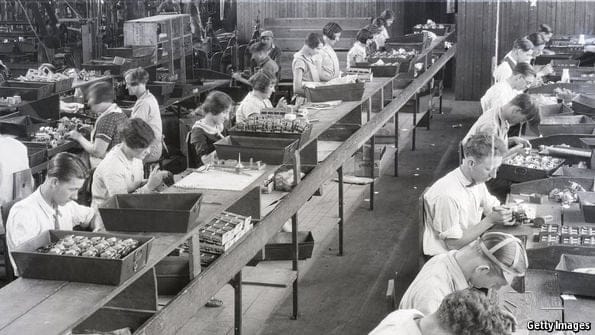Why old-fashioned manufacturing jobs won’t return to the West
Manufacturing is no longer about the production line

By S.W.
MANUFACTURING has a powerful hold over politicians and policymakers in the rich world. Donald Trump, among others, wants to bring the job of making things back to America from the low-cost countries to which it has emigrated. Manufacturing is worthy of political attention. Manufacturers are more likely to be exporters than other types of businesses and those tend to be more productive than non-exporting firms. But when politicians talk about manufacturing it tends to be in terms of the production line: assembling parts into cars, washing machines or aircraft, which adds less value than it once did. It is the processes that accompany assembly—design, supply-chain management, servicing—that today bring the value. Manufacturing, and jobs in manufacturing, have changed in ways that mean that the old jobs will never return to the rich world.
More from The Economist explains

Who will lead Britain’s Conservative Party?
Here are the four candidates vying for the daunting job

When can parents be held responsible for their children’s crimes?
Mass shootings by young assailants are raising the question

Will the debate between Kamala Harris and Donald Trump matter?
Normally presidential match-ups hardly move the needle—but this is no ordinary year
What are the Murdochs fighting about in a secret Nevada court?
The outcome could shape the political orientation of the family’s media empire
The battle between drones and helicopters in Ukraine
Small cheap drones could pose a new threat to expensive Russian craft
A short history of political meddling with the Federal Reserve
Donald Trump’s attacks on the Fed are a throwback to the era before central-bank independence